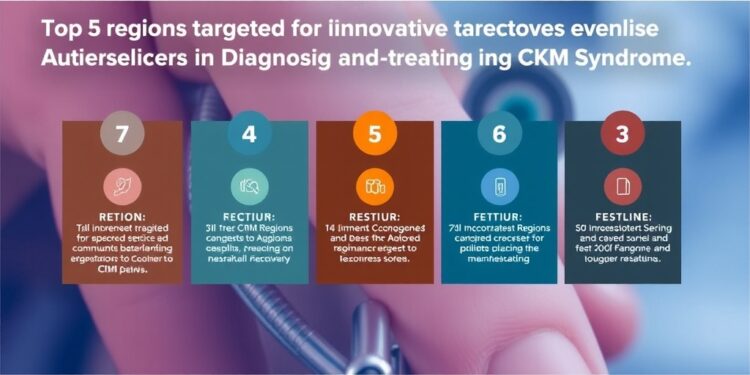DALLAS, Feb. 18, 2025 – The American Heart Association (AHA) has launched an innovative preventive health initiative targeting the complex interplay of chronic conditions known as cardiovascular-kidney-metabolic (CKM) syndrome. This initiative is set to be implemented in five diverse geographic regions across the United States, aiming to raise awareness and enhance diagnosis and treatment for this multifaceted health concern. CKM syndrome encompasses critical health issues including heart disease, kidney disease, diabetes, and obesity, which collectively elevate the risk of severe outcomes such as heart attacks, strokes, and heart failure.
The significance of the CKM syndrome cannot be understated; studies reveal that approximately one in three adults in the United States demonstrate at least three components associated with CKM syndrome. These components include hypertension, elevated triglycerides, abnormal glucose levels, compromised kidney function, and obesity. As these conditions often coexist, there is an urgent need for a comprehensive healthcare approach that looks beyond isolated medical specialties and encourages collaborative care.
The selected regions for this initiative include the Atlanta Metropolitan area, Baton Rouge in Louisiana, San Diego, as well as Washington, D.C., and Maryland, culminating in the Cincinnati metro area in Ohio, which also covers parts of Kentucky. The choice of these areas is based on evaluating disease prevalence, community health needs, and the characteristics of the local healthcare systems. This targeted deployment reflects a strategic effort to effectively allocate resources where they are needed most.
Dr. Chiadi Ndumele, a prominent figure in cardiology and chair of the initiative’s science advisory group, emphasizes the pressing need for healthcare models that adopt a holistic perspective on CKM syndrome. He argues that patients often present clusters of related health issues, necessitating a departure from traditional, specialist-driven care. Instead, adopting a team-based approach may lead to improved health outcomes by integrating multiple aspects of patient health into a singular, cohesive care strategy.
Integral to this initiative is the collaboration among a range of healthcare providers, from primary care clinicians to specialists in cardiovascular and metabolic health. The move towards a CKM model of care prioritizes communication and coordination, aiming to overcome fragmented healthcare systems that currently impede efficient patient management. By fostering a multidisciplinary framework, healthcare providers can ensure comprehensive care that addresses not only the medical needs but also the social determinants of health that significantly impact patient outcomes.
The initiative aligns with the AHA’s broader mission to advance health equity and improve health outcomes for underserved communities, recognizing that socioeconomic factors can exacerbate the prevalence and severity of CKM syndrome. Among the proactive measures being put forth is a systematic approach to screening for social needs that may hinder access to care, such as transportation barriers or financial difficulties in affording medications. This holistic focus connects healthcare providers with community organizations, broadening support networks available to patients facing adverse health conditions.
As part of its clinical framework, the initiative will routinely track health factors associated with CKM syndrome, making it imperative that evidence-based therapies are consistently provided across healthcare settings. This standardized approach will help ensure that patients receive timely and appropriate interventions, reducing the risks associated with the syndrome’s progression. Additionally, by integrating community resource connections, the initiative aims to provide comprehensive support addressing both healthcare and non-medical needs, ensuring that patients can navigate their health journeys more effectively.
Participants in the initiative will utilize a learning collaborative model, enabling site representatives to engage in continuous dialogue about best practices and strategies for improving patient care. By regularly convening to discuss challenges and successes, healthcare facilities can collectively advance their understanding and approach to managing CKM syndrome. This commitment to lifelong learning and shared knowledge is essential in evolving the care landscape for chronic conditions.
The AHA has also partnered with significant sponsors such as Novo Nordisk, Boehringer Ingelheim, and more recently, DaVita, to support the dissemination of CKM syndrome educational resources across the nation. This collaboration with pharmaceutical and healthcare companies underscores the collective responsibility of addressing chronic health conditions not just within clinical settings, but also through community engagement and education.
As the AHA prepares to expand this initiative to a total of 15 regions and 150 healthcare sites, the positive impact is expected to reach and transform the lives of more than a quarter-million patients. This innovative effort highlights the critical need for a coordinated approach in managing CKM syndrome, ultimately positioning healthcare systems to deliver more integrated care, improve patient outcomes, and prevent the debilitating consequences of chronic diseases.
At the heart of this initiative is a commitment to patient-centered care that prioritizes the needs and experiences of individuals living with CKM syndrome. By employing interdisciplinary care teams and fostering a collaborative atmosphere among healthcare providers, the AHA is setting a new standard for addressing complex health conditions. As it gains momentum, the Cardiovascular-Kidney-Metabolic Health Initiative is poised to significantly reduce healthcare disparities and improve health equity across diverse populations.
While the initiative begins with these five regions, it serves as a model that can be adapted and implemented nationwide. By garnering attention for CKM syndrome and advocating for innovative collaborative care, the AHA and its partners encompass a vision that emphasizes the future of healthcare—one that is inclusive, comprehensive, and responsive to the needs of all patients.
Subject of Research: Cardiovascular-Kidney-Metabolic Syndrome
Article Title: American Heart Association Launches Initiative to Combat CKM Syndrome
News Publication Date: Feb. 18, 2025
Web References: American Heart Association – CKM Health
References: AHA Newsroom
Image Credits: American Heart Association
Keywords: CKM Syndrome, Chronic Conditions, Cardiovascular Health, Healthcare Collaboration, Patient Care, Public Health, Health Equity, Community Resources, Interdisciplinary Care, Disease Prevention, Health Initiatives.
Tags: American Heart Association initiativescardiovascular-kidney-metabolic healthchronic disease prevention programsCKM syndrome awareness initiativescollaborative care in chronic conditionscomprehensive healthcare for CKM syndromediabetes and obesity managementgeographic regions targeted for health initiativeshealth disparities in diverse regionsheart disease and kidney disease connectionhypertension and metabolic syndrome linksinnovative healthcare strategies for CKM syndrome





